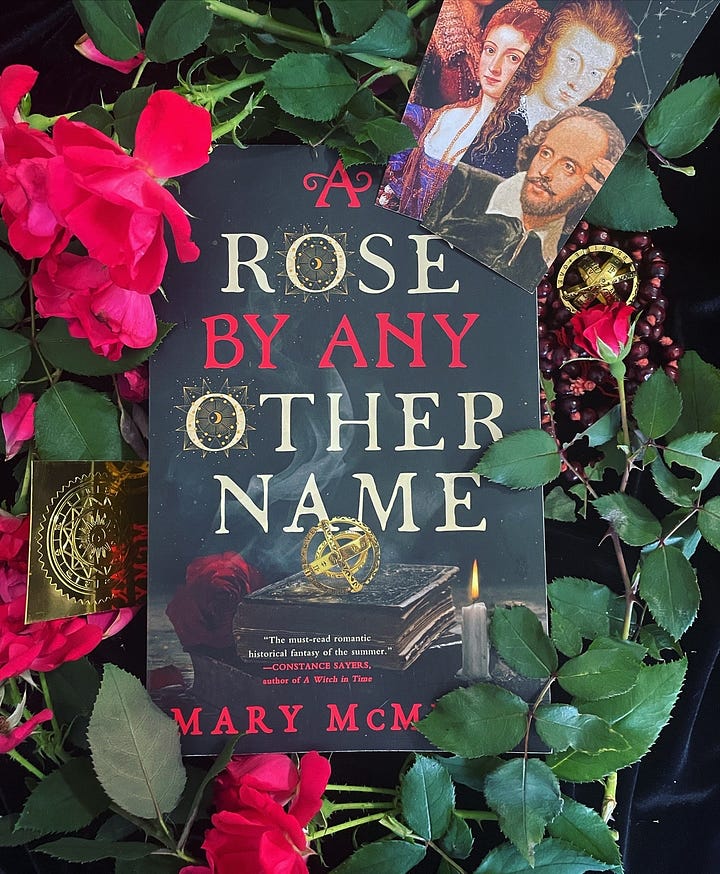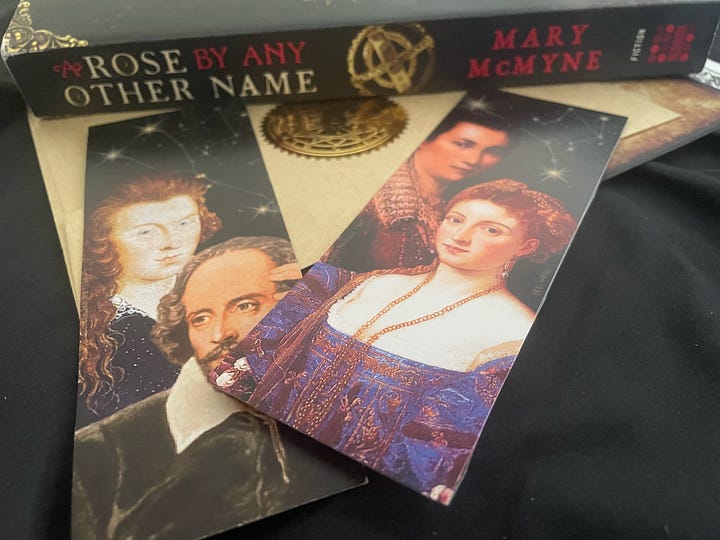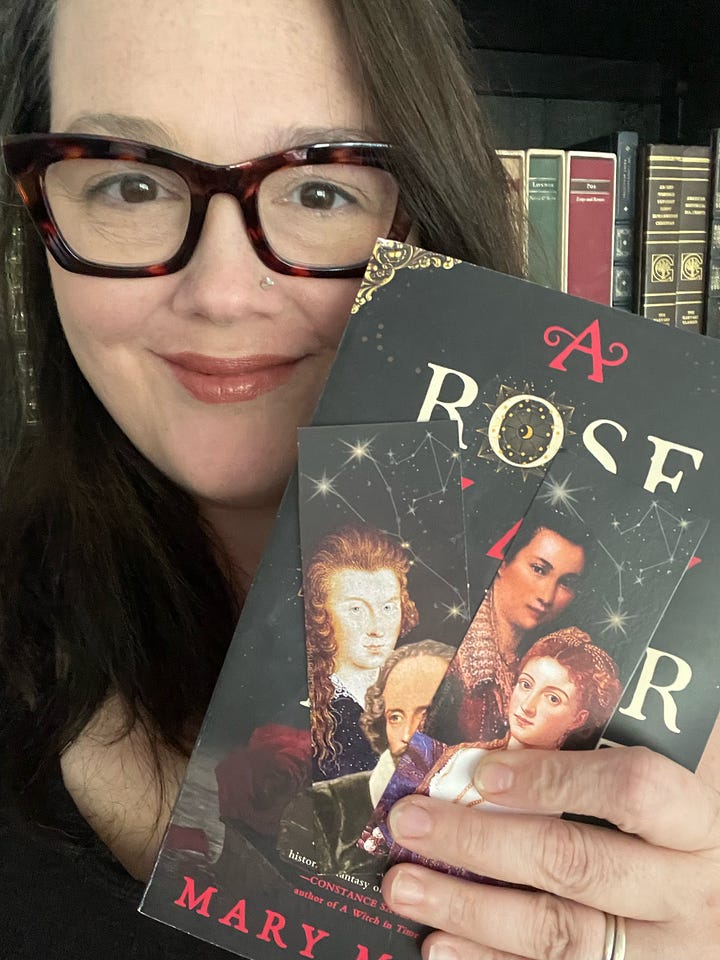Two weeks until release…
Preorder incentives, an exclusive peek at the scene when Rose meets Will, and some news!
Hello, my pretties!
I cannot believe we are two weeks out from the release of A Rose by Any Other Name. I am having all the feelings!
Today I thought I’d share the preorder incentives you’ll get if you order the novel early, as well as the second scene that was chosen when I offered to share exclusive excerpts: the scene in which Rose meets Will for the first time!
First, the incentives! If you preorder, you will get the official bookmark with classic portraits selected to represent all four main characters, a golden astrological seal, and either a signed bookplate if you preorder from a bookstore of your choice and fill out the campaign form, or a directly signed copy if you preorder from Charis Books!




And now, the scene…
When I started this novel, I wanted to imagine a full life for Shakespeare’s Dark Lady. Less than thirty of Shakespeare’s 152 sonnets are about her, and I didn’t want this novel to only be about him. This means Rose doesn’t meet Will until the end of the third chapter, when she and Cecely are searching for Rose’s grandmother’s brothel in Shoreditch.
Imagine it. Twelfth Night, 1592. The streets are full of masked revelers. Excitement is in the air.
We drifted down the street, looking for places to ask about the brothels’ owners’ names. There was a theatre with a dim sign advertising a reprise of Tamburlaine, a brutal play that I had seen the previous summer in Gravesend.
As we tried to decide whether we should enter a tavern without an escort, we saw a masked woman in a gaudy cream gown approach the one across the street. Her bodice was tight, its neck adorned with silvery embroidery, so low it showed the tops of her shapely breasts. Her sleeves were rosy velvet, her skirts damask. Her mask—feathered, pearled, pink—towered over her face. Her hair was dyed a bright golden red. I couldn’t tell if she was a duchess or a courtesan.
When Cecely nudged me, I had my answer. “She might know the place we’re looking for.”
We followed her into the bustling tavern, where she sat at a brightly lit table with three men in their late twenties. They weren’t in festival costume, but we could only see two of their faces. A blond man with tempestuous brown eyes was glaring at a man with shoulder-length brown hair. The brown-haired man’s eyes were an unusual hazel, light brown with flecks of gold that made them glow like the eyes of a cat. He was straddling a chair that he’d turned backward, watching the blond man with a complicated expression that appeared to be a mixture of admiration and contempt.
Between them was a scatter of loose papers covered with writing and splotches of wine. The blond man was smoking a pipe; the scent of tobacco filled the air.
The courtesan peered over their shoulders as if she were reading. A jug of wine sat on the table. The serving woman had given up on keeping their cups filled. They were gentlemen judging by their apparel, or the sons of wealthy merchants at least.
My gaze was drawn to the brown-haired man for reasons I didn’t then understand. He was not especially handsome, though his features were pleasing enough. Perhaps it was his insolent posture, the impression he gave of confidence. His eyes were deep-set, and his shoulder-length hair shone in the candlelight. His eyes were the most interesting thing about him: that gold-flecked brown, aloof and intelligent.
“Enter a messenger, with two heads and a hand,” the blond man said in a disdainful voice. He had the same accent as the Underhills, as if he’d been to Oxford. He smirked, projecting an air of amusement, but I thought I saw a subtle insult in his eyes. “Is this satire?”
The brown-haired man smiled faintly, his eyes flickering with cold amusement, like a cat that climbs onto a tall shelf to watch the world from above. I expected him to speak in an educated manner like the blond man, but he had the accent of a rustic. “Perhaps it is,” he teased, smirking subtly. “Or perhaps not. Who can tell?”
The pull I felt toward him startled me.
“Don’t provoke him, Will,” the third man said. “And for Christ’s sake, Kit, please, content. There are echoes of your work, to be sure, but only because we want Titus to rouse theatregoers as Malta and Tamburlaine did. We want your opinion.”
Tamburlaine. Was this Kit the dramatist? He searched the other two men’s faces, then shifted in his seat, apparently satisfied with what he’d seen. “Aaron is interesting,” he said finally. It took me a moment to realise he was referring to a character. “But unless you intend this to be satire, I don’t think you’ve sufficiently examined his motives.”
“Interesting,” the brown-haired man—Will, I supposed—echoed. His chuckle was forced, and his eyes weren’t laughing.
“Indeed.” Kit shot him an apologetic smile. “I don’t think the script is finished, truth be told. The ending is better than the beginning.”
“If we thought it was finished,” Will said with a tight smile that barely concealed his displeasure, “we would not have sought your advice.”
“Anything else?” the third man asked Kit.
“It’s no masterpiece, but it’s bloody enough to sell tickets. And it’s set in Rome, or at least some vague approximation of the place,” he said dismissively, “so you won’t have trouble with the censors.” He lowered his voice and spoke in the tone of someone offering valuable advice. “If you set something in England, be kind to the Tudors until you have a patron.”
Before Will could respond, Cecely pulled me toward the table. “Pardon me,” she said.
The courtesan gave us an irritated look. “Before you ask, no, I don’t know your ’usbands.” Her voice was the deepest voice I’d ever heard come out of a woman’s mouth, throaty, seductive.
“We’re not here to speak of husbands,” Cecely laughed, as the men stopped bickering to watch our exchange. “We have a question about a subject in which you may have expertise.”
She looked surprised. “Well, then. Out with it.”
Cecely turned to me. I cleared my throat. The woman looked me up and down, her eyes lingering on my clothes, her expression shrewd. I met her eyes squarely, removing my mask. “I’m looking for an Italian bawd whose last name might be abbreviated M-N-L. Would you happen to know such a woman?”
She stared at me, unblinking. For a moment I thought she wouldn’t answer. Then she dissolved into laughter. “Give me a moment, sweeting,” she said, shoulders shaking. “That is not what I expected you to say at all.”
Will caught my eye, his lips quivering with amusement. “Nor I. You are full of surprises.”
When the courtesan stopped laughing, I addressed her. “Well? Do you know such a woman?”
She shook her head. “But that doesn’t mean she don’t exist. I keep to Shoreditch. No doubt you realise, bawds don’t exactly advertise their legal names.”
I drew a deep breath, disappointment making me shaky. “Do you know anyone who might know of her?”
She shook her head. “Try the other districts, love. Smithfield. Southwark. Clerkenwell.”
Will stood. For the first time I noticed his apparel. A fitted, dark-buttoned doublet that emphasized his narrow waist. Black breeches, lace-up sleeves, dark hose beneath black knee-high boots. Simple, but he wore it with dignity.
“I am often in those wards. I’m an actor,” he said with as much pride as someone might state an aristocratic title. “A gentlewoman like you would no doubt do everything in her power to avoid entering such establishments herself.” His eyes danced, as if he were daring me to admit otherwise. “It would be easy for me to visit on your behalf. Tell me where you live, and I’ll call if I find your woman.”
I considered his offer, trying to see the risks from every angle. Cecely caught my eye, giving a subtle shake of her head. I knew what she meant. We didn’t know this man at all. It was foolish to tell him where we lived when he was no doubt trying to extract the information. But something in me wanted to see him again.
“Underhill House, Bishopsgate. Come to the servants’ entrance. Ask for Cecely.” I nodded at my friend. “I don’t want the master of the house to know I was here.”
At the mention of a master of the house, I thought I saw Will’s eyes narrow with—not disappointment, exactly, but interest, as if the possibility that I was with someone else enticed him. “Of course,” he said quickly. “It wouldn’t be proper for you to be in Shoreditch without your father—or is it husband? Forgive me. I didn’t catch your name.”
“She didn’t give it,” the third man said.
“Signora Irraggiungibile,” said Kit.
Will rolled his eyes, either hiding his ignorance of Italian or ignoring the implication that I was above him. His reserve had transformed into an amorous defiance, as if he wanted to challenge me to a contest. Something about the way he looked at me—his wantonness, the promise of misrule—made me want to rise to the challenge.
“Mistress Rose Rushe,” I replied.
“Not Underhill?”
I shook my head. He waited for me to say more, but I didn’t.
“I would’ve expected baronessa, duchessa,” he said. His Italian accent was terrible, but I found his attempt to impress me charming nonetheless. He bowed, pretending to kiss my hand. His movements were graceful, almost elegant. “Will Shakespeare.”
Cecely smiled stiffly.
This novel imagines a very particular character for Will, based on how bawdy and people-pleasing his plays are, the way he wrote Katarina and Petrucchio and Richard III. There’s a rumor that Will seduced a fan of actor Richard Burbage and taunted him about it. It was a challenge to try to capture his arrogance and sexiness and brilliance, combined with the dangerous need to be liked that you see here.
I have been really honored by some of the reviews the novel has been getting—one of my favorites will appear in the July 16 issue of BookPage! Here’s an excerpt:
In A Rose by Any Other Name, author Mary McMyne explores a question that scholars and English teachers have debated for centuries: Who was the “Dark Lady” depicted in some of Shakespeare’s most iconic sonnets? McMyne gives this mystery woman shape, autonomy and desire in the figure of Rose, whom she guides through a dark Elizabethan England… The original world that McMyne has created shines. Her descriptions of magic are rich with heavy, cloying scents and skin-tingling sensations. Her streets feel full of possibility and danger. And Rose and her imperfect, wild compatriots seem to spring from the page. A captivating blend of forensic literary analysis and dark magic, A Rose by Any Other Name is a fascinating exploration into the world of “what if.”
In between launch preparations, I’m starting to think about what’s next after the release. I turned in a book proposal recently, so fingers crossed I’ll have more news for you on that in the months to come!
That’s all for this week, and as always, let me hear from you! Is there a final scene from the novel you’d like a peek at next week? Do you have a request for some subject you’d like me to talk about in this newsletter? Let me know in email or the comments. I’m happy to answer questions about my books, my writing process, or even hear your book recommendations! I was in a reading slump for a bit there after devouring The Secret History, but now I’m reading Constance Sayers’ A Witch in Time, which is absolutely absorbing!
Thank you for reading!
Mary




